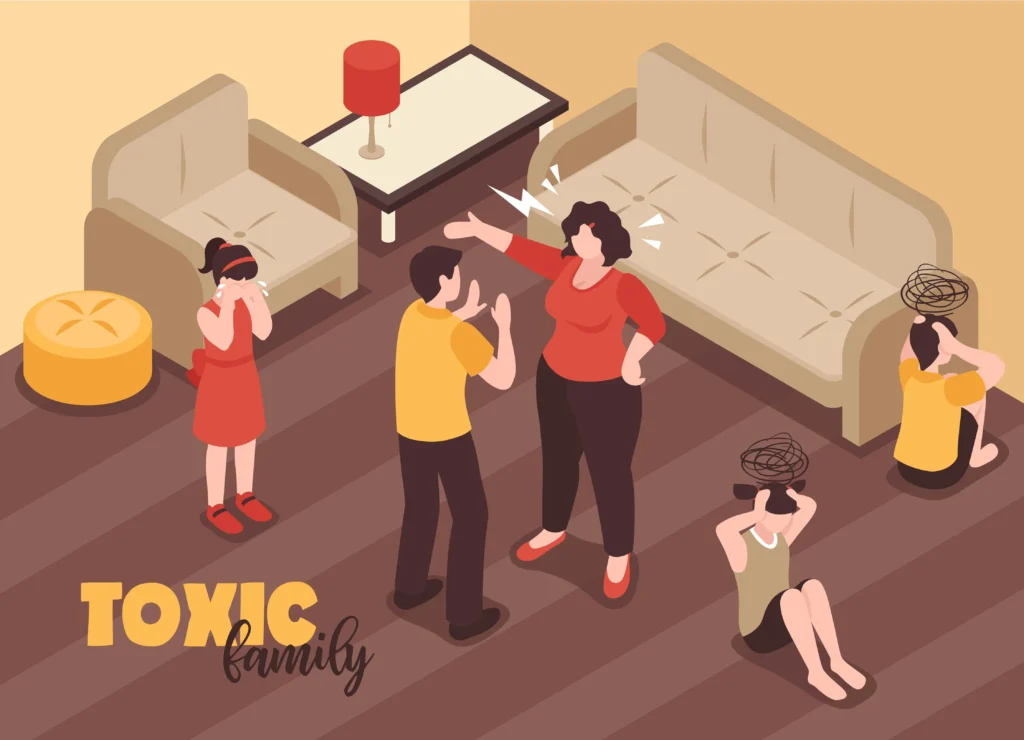Making the decision to cut ties with family is never easy. For many, the idea of ending family relationships feels like breaking an unspoken rule. However, sometimes cutting ties with family becomes necessary for one’s well-being and mental health. Toxic family relationships, abusive family members, or even severe differing values can push individuals to consider family estrangement as a valid option. If you are struggling with this decision, know that you are not alone. This article will delve into the reasons people choose to cut ties with their families, provide guidance on how to navigate this challenging decision, and offer tips for coping with family estrangement and healing from family trauma.
Understanding the Reasons to Cut Ties with Family
Cutting ties with family is a deeply personal decision that often stems from prolonged emotional or physical pain. Here are some common reasons people may consider cutting off family:
- Toxic Family Relationships: In some families, negative patterns of behavior can dominate interactions, making the environment emotionally draining and harmful. Toxic family relationships may involve manipulation, constant criticism, gaslighting, or passive-aggressive behavior. Such relationships can erode self-esteem and lead to anxiety and depression, making cutting ties with family a necessary step toward self-preservation.
- Abusive Family Members: Abuse, whether emotional, physical, or verbal, is a significant reason individuals choose to end family relationships. Living with or constantly interacting with abusive family members can leave deep psychological scars. Recognizing that abuse is never acceptable is crucial, and removing oneself from an abusive situation may be essential for long-term healing from family trauma.
- Differing Values and Beliefs: While families don’t always agree, extreme differences in core values and beliefs can create irreparable rifts. This can be especially true when these differences lead to a lack of respect, understanding, or repeated conflicts. In such cases, cutting off family may become necessary to maintain personal integrity and mental peace.
- Chronic Boundary Violations: Some family members may repeatedly violate personal boundaries, refusing to respect one’s need for privacy, space, or autonomy. Setting boundaries with family is essential, but when these boundaries are consistently ignored or disrespected, it might be time to consider cutting ties to protect your mental health.
How to Make the Decision to Cut Ties with Family
The decision to cut ties with family should not be taken lightly. Here are some steps to consider before making this life-altering decision:
- Self-Reflection: Take time to reflect on your feelings and experiences. Are you constantly feeling drained, anxious, or stressed after interactions with certain family members? Do you find yourself dreading family gatherings? Your emotions can be powerful indicators of the health of your relationships.
- Seek Professional Guidance: Talking to a therapist or counselor can provide valuable insights and support. A mental health professional can help you explore your feelings, understand your family dynamics, and guide you in making a decision that aligns with your well-being. Coping with family estrangement can be easier when you have professional support to help you navigate your emotions and thoughts.
- Evaluate the Impact on Your Life: Consider how the relationship affects your mental and emotional health. If maintaining the relationship causes more harm than good, cutting ties with family might be the best course of action. Think about whether the relationship is helping you grow or holding you back.
- Consider Alternative Solutions: Before making a final decision, explore if there are alternative ways to handle the situation. Can setting stronger boundaries with family help? Is open communication a possibility? In some cases, limiting contact rather than completely cutting off family may be a viable solution.
Coping with Family Estrangement
Once the decision to cut ties with family has been made, coping with family estrangement can be challenging. Here are some strategies to help you navigate this difficult period:
- Accept Your Decision: Understand that choosing to cut ties with family is a decision made for your well-being. It’s natural to feel guilty or sad, but remind yourself of the reasons that led to this choice. Acceptance is the first step toward healing from family trauma.
- Find Support: Surround yourself with a supportive network of friends, partners, or even support groups who understand your situation. Finding support after cutting ties with family is essential for emotional stability. Lean on those who respect your decision and provide a safe space to express your feelings.
- Focus on Self-Care: Taking care of your mental and physical health is crucial during this time. Engage in activities that bring you joy and relaxation. This can include exercise, hobbies, meditation, or anything that helps reduce stress and promote well-being. Coping with family estrangement becomes more manageable when you prioritize self-care.
- Set Healthy Boundaries: After cutting ties, it’s essential to establish and maintain boundaries. This might mean limiting communication with other family members who are not directly involved or choosing not to discuss your decision with those who don’t understand. Setting boundaries with family and others helps create a safe space for healing.
- Seek Professional Help: Coping with family estrangement can be emotionally overwhelming. A therapist can provide tools and strategies to manage your emotions, process your grief, and help you find a path forward. Professional support can be invaluable when you’re healing from family trauma.
Healing and Moving Forward
Healing from family trauma is a journey that takes time, patience, and compassion. Here are some ways to help you move forward:
- Acknowledge Your Feelings: It’s normal to experience a range of emotions, including sadness, anger, and relief. Allow yourself to feel and express these emotions without judgment. Acknowledging your feelings is a critical step in the healing process.
- Forgive Yourself and Others: Forgiveness doesn’t mean forgetting or excusing harmful behavior. Instead, it’s about releasing the hold that anger and resentment have over your life. Forgiving yourself for any perceived shortcomings and forgiving others can be a powerful step toward inner peace.
- Redefine Your Sense of Family: Family doesn’t always have to be defined by blood. Invest in relationships with friends, partners, or mentors who provide the love, support, and respect you deserve. Creating a chosen family can fill the emotional void left by estrangement and provide a sense of belonging. Finding support after cutting ties with family can help you build a new support network.
- Focus on Personal Growth: Use this time to focus on your personal development. Engage in activities that help you grow, such as pursuing new hobbies, furthering your education, or volunteering. Personal growth can provide a sense of purpose and help you reclaim your identity outside of your family dynamics.
- Stay Open to Reconciliation (If Safe and Possible): In some cases, time and space can lead to healing and understanding. While not always possible or advisable, staying open to reconciliation when it is safe and healthy can provide closure. However, this should only be considered if there is genuine change and respect from both parties.
Conclusion
Cutting ties with family is a difficult and deeply personal decision, often filled with emotional complexities. Whether due to toxic family relationships, abusive family members, or irreconcilable differences, it’s essential to prioritize your mental and emotional well-being. Remember, it’s okay to choose peace and safety over maintaining harmful family connections. By taking the time to reflect, seek support, and focus on healing, you can find the strength to move forward and create a life filled with positivity and healthy relationships.





